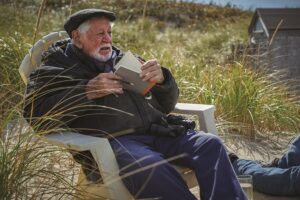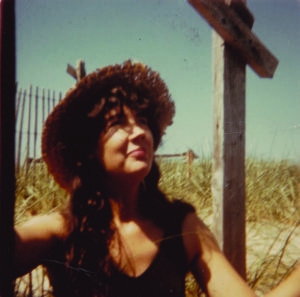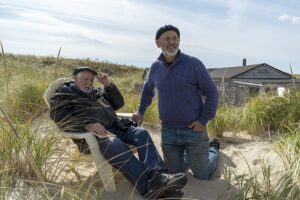PROVINCETOWN — The leasing contest that the National Park Service announced on May 1 for eight of the 18 dune shacks in the Peaked Hill Bars Historic District, on the back shore of Provincetown and Truro, will not be the last one.

A ninth dune shack that Jeanne “Frenchie” Chanel built in 1942 and that her friend Salvatore Del Deo and his family have helped maintain since 1953 is also going to be put into a public leasing competition in the near future.
Del Deo, 94, received a letter in late March from a Park Service realty officer telling him he had 30 days to remove his personal items from the shack and surrender the keys. After an appeal from Romolo Del Deo, Sal’s son, the Park Service sent a second letter extending the deadline to 90 days — a term that will end in late June. The Park Service will conduct a competitive leasing process for the shack, the second letter confirmed.
Cape Cod National Seashore officials did not respond to written questions from the Independent about further details of the Park Service’s plans for the shack.
Sal, a celebrated artist and restaurateur, has spent summers in the shack since 1946 — 15 years before the Cape Cod National Seashore was created. He spent his first nights with his future wife, Josephine, there in 1953 — a “premarriage honeymoon” that was a gift from Frenchie, who believed the shack was for lovers, Romolo said.
Sal said the notice to quit is a “betrayal” of Josephine, who died in 2016, and who, by all accounts, was instrumental in persuading Provincetown to entrust the entirety of the Province Lands to the new National Seashore in a pivotal town meeting vote in March 1961 — an event described by David W. Dunlap in her obituary in the New York Times.

“It’s a betrayal, really, of the goodwill that we all finally embraced with the Park,” Sal said.
After fighting to help create the National Seashore, Josephine fought the Park Service’s destruction of dune shacks in the 1970s and ’80s. She played a major role in gathering the documentation that helped establish the Dune Shacks of Peaked Hill Bars Historic District, which was formally protected in 1989.
Toward the end of her life, then-National Seashore Supt. George Price invited her to speak to a class of new rangers at Salt Pond Visitor Center in Eastham, Del Deo said.
Price said, “ ‘I want to introduce Josephine Del Deo, who did so much to create this park,’ ” Del Deo recalled. “ ‘If it weren’t for her, we wouldn’t be here, so listen to what she has to say about the history here.’ ”
About two years later, at a graveside service for Josephine, Price asked Romolo if he could speak. In full uniform, Price delivered a nearly half-hour eulogy of her lifetime of achievements, including preserving the Province Lands for posterity, Sal said.
“It came out of the blue, and I was startled, but I was also proud of my wife that she had made such a dent in this bureaucracy,” Del Deo said. “That she could infiltrate her personality into this big, monolithic thing known as the National Park.
“I wish Josie were here now,” Del Deo added. “I feel very inadequate. She was like David and Goliath — except that her credo was ‘We can all live together.’ ”
A Lifetime Lease
Unlike the current leasing contest being held for eight of the shacks — which directly contravenes the National Seashore’s own Historic District Preservation and Use Plan from 2012 — there is not much question about the legality of the quit notice Del Deo received. After a federal “taking” of the shack in 1973, the Park Service gave Chanel and her daughter Adrienne “Shatzi” Chanel a lease on the shack that would last for both of their lifetimes.
Frenchie died in 1983, and Shatzi — whose legal name was Adrienne Augustine Antoinette Schnell — died in Sparta, Tenn. in 2016. Her obituary ran in the Sparta Expositor.
Unlike a typical lease, these lifetime arrangements, or “reservations of use and occupancy,” did not involve rent payments or any routine correspondence, Del Deo said. He continued paying taxes to the town of Provincetown for the shack, as he had done for many years, but almost seven years went by before the Park Service discovered that Shatzi Chanel was no longer living.
The eight dune shacks that are currently up for lease were all formerly on long-term “reservations” similar to the one the Chanels had. In each of those cases, when the long-term lease expired the Park Service wrote one-year special-use permits, sometimes for many years in a row.
Romolo said he had hoped the Park Service might offer one-year permits for the remainder of Sal’s life.

Unlike the other long-term leaseholders, however, the Del Deos are not named on the Park’s “reservation of use” for that shack. Only Frenchie and Shatzi are. Frenchie did will her shack to Josephine and Sal, according to both Sal and Romolo, but inheritance law is not binding on lifetime leases.
“For years, the Park was working with us, acknowledging they knew we were out there — it’s not exactly a state secret,” Romolo said. Sal’s name is on the official permits for a major reconstruction project from 1973, Sal said, and their whole family is in Dr. Robert Wolfe’s ethnographic report on dune shack history and culture.
“Sal has probably the longest history of continuous dune shack use of anyone,” Romolo said. “It’s 77 summers, except when he was in the Korean War.”
Despite Supt. Price’s eulogy of only seven years ago, that history seems unlikely to move current National Park administrators, Romolo said.
“Bureaucratic systems try to simplify things so they can manage them,” Romolo said. “I’m sure they’re well-intentioned and think they’re doing an excellent job.
“But the Park has a mandate to preserve cultural diversity as well as natural diversity, and eradicating the dune dwellers would definitely destroy that,” Romolo added. “Once the dune dwelling community is gone, it will be like any other living thing that has been wiped out.
“There’s no one person who can’t be replaced,” Romolo went on. “I don’t know if there’s a remedy for our situation. But this kind of experience and knowledge and cultural depth is not easily transferable — and I wish I knew how we could preserve the other dune dwellers.”
Sal said the Park Service is treating the shacks like real estate — and that their significance to these towns is much deeper.
“When I saw this place, I said this is like the beginning of life on Earth,” said Sal. “It’s elemental, spiritual.
“I’m a painter and a pantheist, and I love nature,” Sal continued. “We’re big, compared to the tiny little things that are in the woods, and we walk there, not knowing that we’re stepping on something that’s alive. Inadvertently, in our innocence, sometimes we destroy things.
“I think of the Park as being like that,” Sal said, “a huge monolithic thing. They mean to do right. But sometimes they miss the forest for the trees — and they’re destroying an oasis that people had created out of nothing but flotsam and jetsam.”



